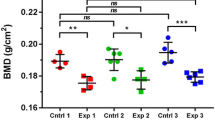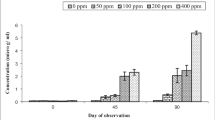Abstract.
We hypothesized that fluoride partly acts by changing the levels of circulating calcium-regulating hormones and skeletal growth factors. The effects of oral fluoride on 24 female, Dutch-Belted, young adult rabbits were studied. The rabbits were divided into two study groups, one control and the other receiving about 16 mg fluoride/rabbit/day in their drinking water. After 6 months of fluoride dosing, all rabbits were euthanized and bone and blood samples were taken for analyses. Fluoride treatment increased serum and bone fluoride levels by over an order of magnitude (P < 0.001), but did not affect body weight or the following serum biochemical variables: urea, creatinine, phosphorus, total protein, albumin, bilirubin, SGOT, or total alkaline phosphatase. No skeletal fluorosis or osteomalacia was observed histologically, nor did fluoride affect serum PTH or Vitamin D metabolites (P > 0.4). BAP was increased 37% (P < 0.05) by fluoride; serum TRAP was increased 42% (P < 0.05); serum IGF-1 was increased 40% (P < 0.05). Fluoride increased the vertebral BV/TV by 35% (P < 0.05) and tibial ash weight by 10% (P < 0.05). However, the increases in bone mass and bone formation were not reflected in improved bone strength. Fluoride decreased bone strength by about 19% in the L5 vertebra (P < 0.01) and 25% in the femoral neck (P < 0.05). X-ray diffraction showed altered mineral crystal thickness in fluoride-treated bones (P < 0.001), and there was a negative association between crystal width and fracture stress of the femur (P < 0.02). In conclusion, fluoride's effects on bone mass and bone turnover were not mediated by PTH. IGF-1 was increased by fluoride and was associated with increased bone turnover, but was not correlated with bone formation markers. High-dose fluoride treatment did not improve, but decreased, bone strength in rabbits, even in the absence of impaired mineralization.
Similar content being viewed by others
Author information
Authors and Affiliations
Additional information
Received: 5 November 1996 / Accepted: 3 January 1997
An erratum to this article is available at http://dx.doi.org/10.1007/s002239900346.
Rights and permissions
About this article
Cite this article
Turner, C., Garetto, L., Dunipace, A. et al. Fluoride Treatment Increased Serum IGF-1, Bone Turnover, and Bone Mass, but Not Bone Strength, in Rabbits. Calcif Tissue Int 61, 77–83 (1997). https://doi.org/10.1007/s002239900299
Published:
Issue Date:
DOI: https://doi.org/10.1007/s002239900299




